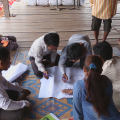New podcast: Human rights-based approaches in Mekong research
This latest episode of our "Research 4 All" podcast series discusses how human rights-based approaches help make research more empowering since water management is not a technical issue but about who has the rights and power to make decisions.
Episode 04 hosts: Rajesh Daniel and Kadesiree Thossaphonpaisan
Sound editing: Rajesh Daniel and Kadesiree Thossaphonpaisan
Artwork: Kadesiree Thossaphonpaisan; Cover photo by Diego Gennaro on Unsplash
Series producers: Rajesh Daniel and Leonie Pearson
In this episode, we are joined by Dr. Vatchararuthai Boontinand (Ajarn Jan), SUMERNET advisor on Human Rights, and lecturer at the Institute of Human Rights and Peace Studies, Mahidol University. She explains how human rights-based approaches encompass empowerment, non-discrimination and participation. We learn how a "rights-based approach" is critical in water insecurity research, and about dealing with the challenges while working in different contexts and trying to improve the rights and livelihoods of marginalized peoples. Ajarn Jan explains how to better implement rights-based approaches in research especially to benefit local communities and empowering them.
Download the transcript using the link below. Links for additional resources and reading are also included in the transcript.
SUMERNET podcasts highlight different aspects of our work on research, policy engagement, capacity building and communications in the Mekong Region.
Visit our website www.sumernet.org to find out more about our work to improve policies and practices in reducing water insecurity in the Mekong Region.
Info
This story is part of the following project
SUMERNET 4 All: Engaging with water insecurity in the Mekong Region
Country
Related people
You might be interested in
-
SUMERNET Vision Guide introducing the new phase "SUMERNET 4 All"
The new, revised "Vision Guide" for SUMERNET is now available. This vision guide presents an overview of SUMERNET - its origins and governance structure, background to the network, aims, key research areas, engagement with policy, and outreach products
![SUMERNET Vision Guide introducing the new phase "SUMERNET 4 All"]()
-
SUMERNET 4 All Call for Proposals on Joint Action
SUMERNET 4 All (S4A) provides financial support and technical assistance to consortia of researchers and boundary partners from the Mekong Region
![SUMERNET 4 All Call for Proposals on Joint Action]()
-
SUMERNET launches redesigned website to provide a fresh visual look and direction
SUMERNET is proud to announce the launch of our redesigned website to coincide with our new phase of work on addressing water insecurity in the Mekong Region.
![SUMERNET launches redesigned website to provide a fresh visual look and direction]()
 By
By 





 Read more about SUMERNET
Read more about SUMERNET
